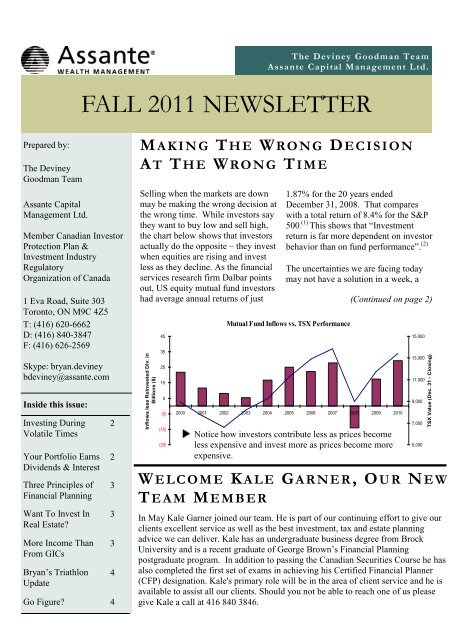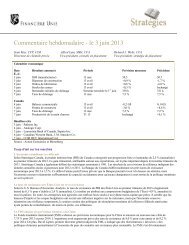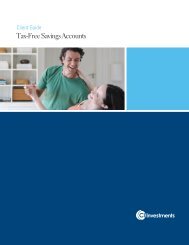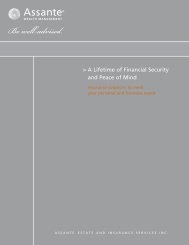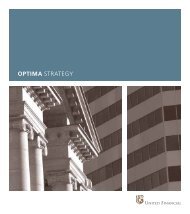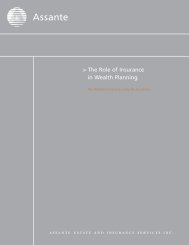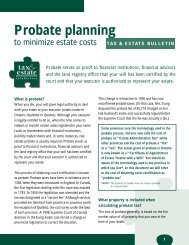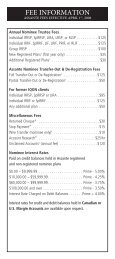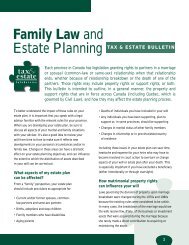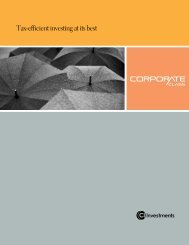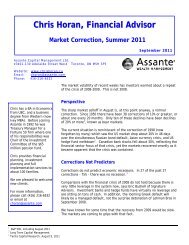FALL 2011 NEWSLETTER - Assante Wealth Management
FALL 2011 NEWSLETTER - Assante Wealth Management
FALL 2011 NEWSLETTER - Assante Wealth Management
Create successful ePaper yourself
Turn your PDF publications into a flip-book with our unique Google optimized e-Paper software.
Inflows less Reinvested Div. in<br />
Billions ($)<br />
TSX Value (Dec. 31 - Closing)<br />
The Deviney Goodman Team<br />
<strong>Assante</strong> Capital <strong>Management</strong> Ltd.<br />
<strong>FALL</strong> <strong>2011</strong> <strong>NEWSLETTER</strong><br />
Prepared by:<br />
The Deviney<br />
Goodman Team<br />
<strong>Assante</strong> Capital<br />
<strong>Management</strong> Ltd.<br />
Member Canadian Investor<br />
Protection Plan &<br />
Investment Industry<br />
Regulatory<br />
Organization of Canada<br />
1 Eva Road, Suite 303<br />
Toronto, ON M9C 4Z5<br />
T: (416) 620-6662<br />
D: (416) 840-3847<br />
F: (416) 626-2569<br />
Skype: bryan.deviney<br />
bdeviney@assante.com<br />
M A K ING THE WRONG DECISION<br />
A T THE WRONG TIME<br />
Selling when the markets are down<br />
may be making the wrong decision at<br />
the wrong time. While investors say<br />
they want to buy low and sell high,<br />
the chart below shows that investors<br />
actually do the opposite – they invest<br />
when equities are rising and invest<br />
less as they decline. As the financial<br />
services research firm Dalbar points<br />
out, US equity mutual fund investors<br />
had average annual returns of just<br />
45<br />
35<br />
25<br />
15<br />
1.87% for the 20 years ended<br />
December 31, 2008. That compares<br />
with a total return of 8.4% for the S&P<br />
500. (1) This shows that “Investment<br />
return is far more dependent on investor<br />
behavior than on fund performance”. (2)<br />
The uncertainties we are facing today<br />
may not have a solution in a week, a<br />
Mutual Fund Inflows vs. TSX Performance<br />
(Continued on page 2)<br />
15,000<br />
13,000<br />
11,000<br />
Inside this issue:<br />
Investing During<br />
Volatile Times<br />
Your Portfolio Earns<br />
Dividends & Interest<br />
Three Principles of<br />
Financial Planning<br />
Want To Invest In<br />
Real Estate<br />
More Income Than<br />
From GICs<br />
Bryan’s Triathlon<br />
Update<br />
Go Figure 4<br />
2<br />
2<br />
3<br />
3<br />
3<br />
4<br />
5<br />
(5)<br />
(15)<br />
(25)<br />
2000 2001 2002 2003 2004 2005 2006 2007 2008 2009 2010<br />
Notice how investors contribute less as prices become<br />
less expensive and invest more as prices become more<br />
expensive.<br />
W E L C OME KALE GARNER, OUR NEW<br />
T E A M MEMBER<br />
In May Kale Garner joined our team. He is part of our continuing effort to give our<br />
clients excellent service as well as the best investment, tax and estate planning<br />
advice we can deliver. Kale has an undergraduate business degree from Brock<br />
University and is a recent graduate of George Brown’s Financial Planning<br />
postgraduate program. In addition to passing the Canadian Securities Course he has<br />
also completed the first set of exams in achieving his Certified Financial Planner<br />
(CFP) designation. Kale's primary role will be in the area of client service and he is<br />
available to assist all our clients. Should you not be able to reach one of us please<br />
give Kale a call at 416 840 3846.<br />
9,000<br />
7,000<br />
5,000
Page 2<br />
(Continued from page 1)<br />
month or even longer. Extreme market volatility<br />
reminds us that equities are best suited as long-term<br />
holdings, rather than as short-term investments. It's<br />
also important to remember that annual returns from<br />
equities - and growth in corporate earnings - have<br />
historically averaged approximately 6% to 8% over<br />
the long term, but they fluctuate from year to<br />
year. Equity prices over the short term are linked not<br />
just to corporate earnings but also to investors'<br />
emotions. When negativity dominates the news, as it<br />
does today, investors become less willing to buy<br />
equities, and this pushes equity prices lower. And<br />
when the news is positive, investors are optimistic and<br />
equity prices are pushed higher. Remember that when<br />
everyone is discouraged and fearful, risk in the market<br />
is substantially reduced and the opportunity might<br />
be greater. That's because when people are negative,<br />
most of the selling has been done and the bad news is<br />
largely factored into security prices. A bearish<br />
consensus is a prerequisite for a market bottom and<br />
sets the stage for above-average returns on the way<br />
back up.<br />
I N V E STING DURING VOLATILE TIMES<br />
Achieving our retirement income goals requires us to<br />
invest in ways that get us higher returns than those<br />
paid by GICs and government bonds. However,<br />
alongside higher returns also comes higher<br />
volatility. With today's 5 year GICs and 10 year<br />
government bonds paying only 2.5% in annual<br />
interest, this return is not enough to meet our<br />
accumulation goals when saving for retirement nor is<br />
it sufficient to meet our income needs in<br />
retirement. The only thing more painful than<br />
watching your savings decline 10 per cent is realizing<br />
how much more money you will have to save for<br />
retirement if you are unwilling to take on any equity<br />
market risk.<br />
Market volatility affects us in different ways<br />
depending on where we are in our lifecycle.<br />
For those saving for retirement depressed markets<br />
offer the opportunity of buying assets cheap and<br />
watching them rise in value over time.<br />
For those nearing retirement or in retirement<br />
market volatility can play havoc with our<br />
retirement income. A market downturn in the 10 -<br />
15 years before retirement or in the early years of<br />
retirement may force you to reduce your<br />
retirement income or run the risk of outliving your<br />
savings.<br />
While we expect market volatility to continue, we<br />
believe that the guaranteed retirement income<br />
solutions that we offer such as Manulife Income Plus,<br />
SunLife Sunwise Essentials and Canada Life<br />
Lifetime Income Benefit are excellent ways to insure<br />
that your retirement income is not adversely affected<br />
by market downturns yet allows you to receive a pay<br />
increase if markets appreciate. It's a "heads you win,<br />
tails you don't lose" proposition. We have promoted<br />
these guaranteed retirement income solutions in our<br />
newsletter and in our client meetings since the Spring<br />
of 2008 and they have proven themselves to be<br />
excellent solutions.<br />
Y OUR PORT F O L I O EAR NS<br />
D I V I DENDS AND INTEREST<br />
The government and corporate bonds as well as the dividend paying<br />
equities that are in your portfolio pay you dividends and interest each<br />
year which accumulate on a tax deferred basis in your RRSP, TFSA<br />
and RESP. The yield on a balanced portfolio, not counting capital<br />
gains, is generally in the range of 3% annually which is actually more<br />
than today's approximate 2.5% rate on a five year GIC.
Page 3<br />
T HREE PRINCIPLES OF FINANCIAL PLANNING<br />
1. Spend Less Than You Earn<br />
Twenty-two years after releasing The <strong>Wealth</strong>y Barber with its focus on Paying Yourself First, David Chilton is<br />
back with a follow-up, The <strong>Wealth</strong>y Barber Returns. In this sequel, David makes it clear that there is no magic<br />
bullet that can substitute for consistently saving for retirement, year in and year out. Most need to save till it<br />
hurts, he says. Recognizing that most people find it near impossible to save, Chilton tries to shift their focus to<br />
spending less. His mantra this time is "I can't afford it". He feels this battle cry needs to be used more.<br />
2. Your Debt Needs To Retire Before You Do<br />
Entering retirement free of debt is one of the best ways to increase your discretionary retirement income. Not<br />
having to make payments for mortgages, lines of credit, car loans, student loans or credit cards means you will<br />
have a lot more income to spend on your favourite activities.<br />
3. Have a Financial Plan<br />
Developing a financial plan that includes a roadmap to achieving your financial objectives is one of the key<br />
factors to achieving financial success. Canadians who undertook comprehensive and integrated financial plans<br />
are “significantly more optimistic about their personal wellbeing as compared with those who have not.” and<br />
generally are “more confident about reaching a wide spectrum of life goals.” (3) If you want to update your<br />
financial plan please call Bryan to book an appointment.<br />
W ANT TO INVEST IN REAL ESTATE<br />
Real estate investing is seen by many as an<br />
excellent way to make money. After all, we<br />
have seen our own homes increase in value<br />
and therefore it follows that owning even<br />
more real estate will only add to our<br />
wealth. There is one major problem with<br />
investing in property - being a landlord.<br />
Fortunately, there's a way to invest in real<br />
estate without ever having to chase after the<br />
rent money or unplug blocked toilets. REITs<br />
(real estate investment trusts) allow you to be<br />
an armchair landlord in sectors of the property<br />
market including apartment blocks,<br />
retirement homes and commercial<br />
space. For example, if you invest<br />
$300,000 and it earns a return of 6%<br />
annually you will receive $1,500 per<br />
month of tax advantaged income. (4) We<br />
have available a number of investment<br />
vehicles that diversify your investment<br />
across a number of these real estate<br />
investments. Ask Bryan about this at<br />
your next appointment or by e-mail.<br />
M ORE INCOME THAN FROM GICS: MANULIFE<br />
P E N S I ONBUILDER<br />
If you find that the income you are or will be receiving from your GICs or government bonds will not be<br />
sufficient to meet your income needs, Manulife is now offering PensionBuilder. If you are over 50 years of age<br />
and find that a 2.5% return is too low, PensionBuilder is a guaranteed income solution that can help you better<br />
meet your income objectives. This brand new guaranteed solution works even better over the longer term, so<br />
the sooner you start and the more time before you need the income, the better you will do. Call Bryan to book<br />
an appointment to find out how you can generate higher income.
B RYAN’S TRIATHLON UPDATE<br />
On Sunday, September 11 th I crossed the finish line of the Muskoka 70.3 half iron-man. Most importantly, I<br />
finished healthy and in good spirits. The last six months of training consumed a noteworthy amount of my life.<br />
In many cases I needed to wake up at 4 am in order to get in a workout. As Steven Covey, author of The 7<br />
Habits of Effective People, wrote: "Put First Things First.” The early morning became my greatest ally. Below<br />
are four lessons that reinforced themselves during the training process.<br />
Get help and save time. There are countless strategies and books on triathlon. I read a few and more<br />
information only caused more confusion. Essentially, the books were telling me how to become a coach when I<br />
wanted to be an athlete. So, I hired a coach and let him deal with the details. This let me concentrate on training.<br />
Try not to worry about what you can't control. I tried not to concern myself with results and improvement<br />
levels too much. I wanted my focus to be on what I could directly affect. Getting workouts done 6 days a week<br />
was tough enough. The rest would come. I often think to myself that people worry too much about the<br />
insignificant things, like what protein shake to drink, and miss the big picture, like not getting enough exercise.<br />
Life throws curveballs. I ran into the misfortune of getting quite ill the week before the race. Overcoming the<br />
physical illness was one thing but adjusting my expectations for the race was another. I reconciled that I would<br />
probably be slower and more tired along the way. That was ok.<br />
Don’t measure your success against the success of others. I tried not to worry about who was passing me or<br />
what time I would end up with. It will drive you crazy. There will always be someone faster out there. Enjoy<br />
the moment. It was unbelievable to ride a closed 94 km bike course in the Muskoka hills without any worry<br />
about cars.<br />
What now I really enjoyed the training process and know that I will continue with my triathlon hobby. But in<br />
what shape or form First, I'll take a month off, do some breaststroke and enjoy my sour cream and onion chips.<br />
Thank you for all your well wishes along the way.<br />
Go Figure<br />
References:<br />
(1) The Globe and Mail, April 7, 2010<br />
(2) Quantitative Analysis of Investor Behaviour, 2007<br />
(3) The Financial Planning Standards Council, 2010<br />
(4) Sentry REIT Fund - Estimated Yield as at Oct. 3, <strong>2011</strong>.<br />
<strong>Assante</strong> Capital <strong>Management</strong> Ltd. is a member of the Canadian<br />
Investor Protection Fund and is registered with the Investment<br />
Industry Regulatory Organization of Canada.<br />
This material is provided for general information and is subject<br />
to change without notice. Every effort has been made to compile<br />
this material from reliable sources however no warranty can be<br />
made as to its accuracy or completeness. Before acting on any of<br />
the above, please make sure to see me for individual financial<br />
advice based on your personal circumstances. Services and products<br />
may be provided by an <strong>Assante</strong> Advisor or through affiliated<br />
or non-affiliated third parties. Commissions, trailing commissions,<br />
management fees and expenses, may all be associated with<br />
mutual fund investments. Mutual funds are not guaranteed, their<br />
values change frequently and past performance may not be repeated.<br />
Please read the prospectus and consult your <strong>Assante</strong><br />
Advisor before investing.


